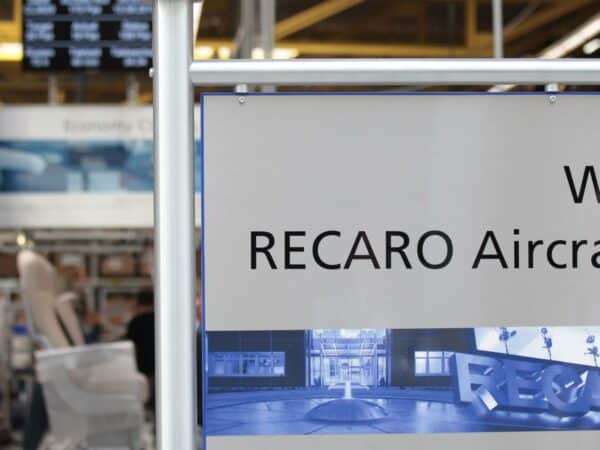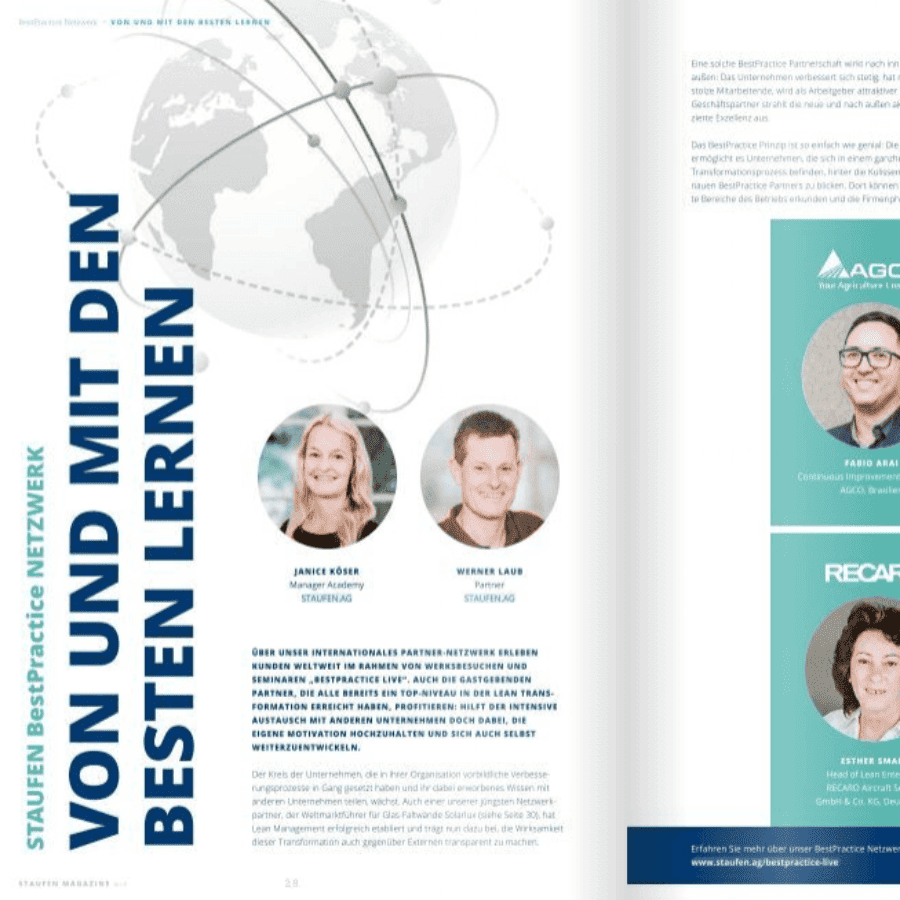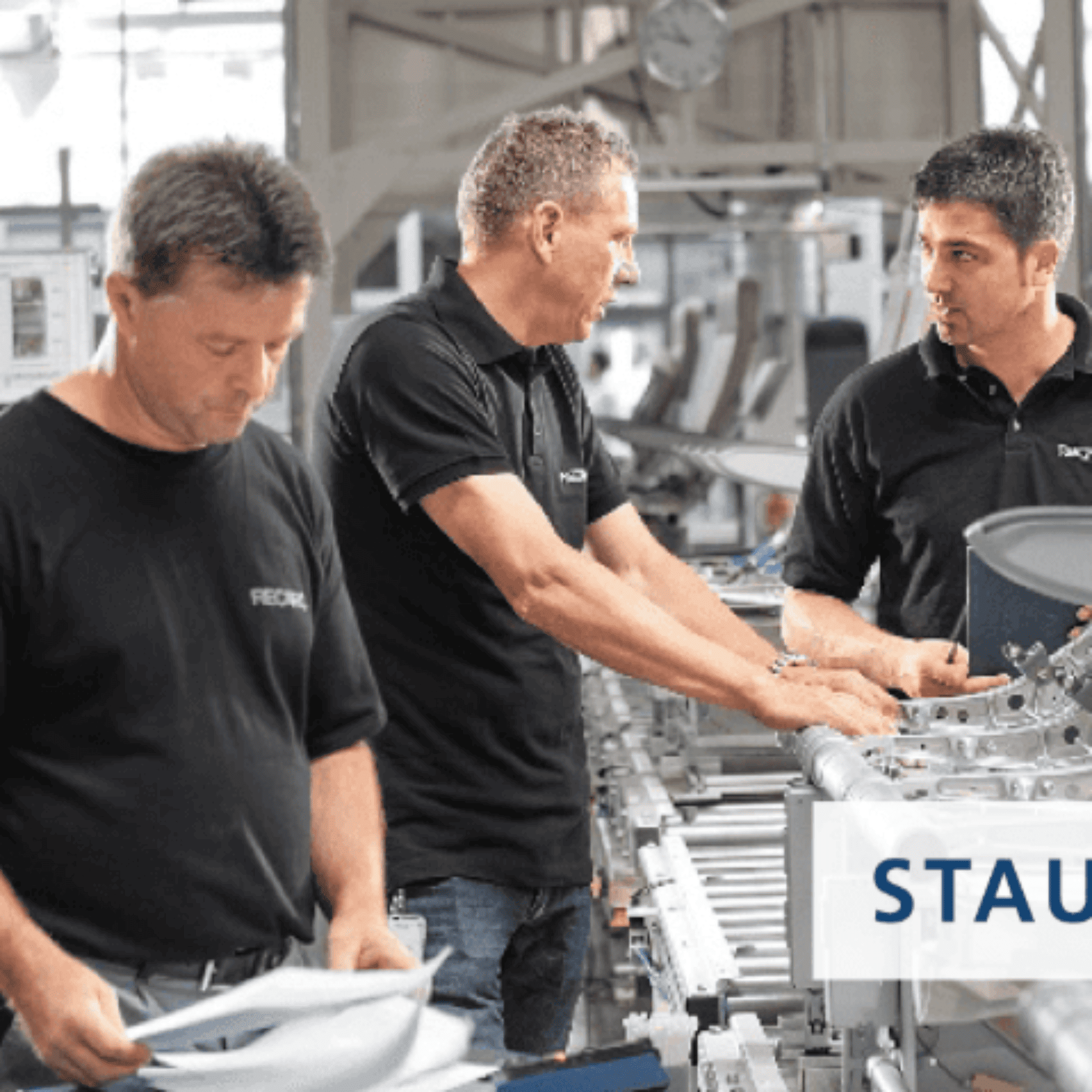
Especially for companies operating on an international scale, a lean structure can often improve many processes. In a dialog with Janice Köser, Academy Manager at Staufen AG, Esther Smart, Head of Lean Enterprise at RECARO Aircraft Seating GmbH & Co. KG, discusses her own experiences. The Lean Principles proved to be groundbreaking during the pandemic as well.
The daily work routine at five international locations
RECARO’s headquarters are located in Schwäbisch Hall in the German state of Baden-Württemberg. There are also subsidiaries in the USA, South Africa, Poland and China. Developing a standard structure for all these segments of the company that carries the company’s values while accounting for cultural differences between the nations is a balancing act. This has been in Esther Smart’ s area of focus since 2013.
“It’s my responsibility to ensure that the right training and methods are used and that we as a team develop the standards and stick to them as well,” she explains. To this end, a Lean Enterprise program is developed every year, which is then implemented at the different sites – some tasks have to be executed at every site for this to happen. Tailoring them to the particular environment requires both experience and intuition.
Certain Lean standards are developed and maintained through training and methods. The approach must be holistic, and Esther Smart and her team work with management at each site to ensure that the measures are implemented.
The benefit of Lean Principles within the company
Esther Smart assumed her position in October 2013. This was the moment that a decision was made at RECARO to expand the Lean Principles that were already being successfully applied in production to all other areas in the company: “Our intention is to transform to become a lean enterprise and we really want to widen this idea to all areas, customers and suppliers as well.”
Esther Smart, who completed her education in lean policies in the United States, then proposed cutting the lead times in half. On average, 60 weeks were set as the model, which in her mind was too long. “However, I was also a newbie in aviation. I really didn’t know which hurdles I had to overcome. If I had, I would have probably slept on it again”, she admits in retrospect.
Despite the challenges that the ambitious project brought about, throughput times have today in the meantime dropped by 46 percent. So, implementing Lean Principles in every company area comes with a significant benefit – plus one more that customers asked for: In a 2013 customer survey, the attributes design, on-time delivery and quality were highly praised, while customers certified that the company had a need to optimize their throughput times.
Lean principles from an end-to-end perspective
Companies dealing with Lean principles for the first time generally implement them in production first. However, greatest success is always achieved when the principles are applied throughout the entire company. Working with a consultant from Staufen, Esther Smart realized this during the analysis weeks: these principles should also be implemented in administrative areas. This has since been achieved, and regular workshops on the topic are held with customers and suppliers as well.
Lean principles in the administrative area
It may be easier to implement lean principles in production areas than in administrative ones, but the basic cornerstones always remain the same: waste must be reduced, pull principles must be introduced, and all work steps must be aligned with a steady flow.
Esther Smart recounts an example in which office areas that had been organized on a completely individual basis were streamlined: Kanban systems replaced the many individual orders, and the 20 individual assistants for all areas were pooled into one office management group. Today, this group successfully works across all areas, significantly simplifying processes. “It is actually very easy to transfer this to the indirect areas, but the idea has to be there first,” comments Esther Smart on the implementation.
“No judging, no blame”
An analysis by a Lean consultant reveals precisely which process is value-creating and which is not. Many business owners and their staff as well are initially shocked by the high number of processes that do not add value and some tend to take the result personally. Yet this is not actually the point: the criticism is not directed at the employees per se, but merely at the processes as they are currently standardized. Consequently, no one should take this analysis as a rebuke for bad work, but merely as an indication of the dysfunction of certain procedures. Once analyzed, they can be remedied.
Using Lean Principles to get through the COVID crisis
COVID-19 plunged many industries into crisis, and RECARO, which produces aircraft seats, was and still is affected as well. Having said that, the drop was also severe just before the pandemic: 2019 was a record year for the company, which saw its sales increase by 25 percent. In 2020, by contrast, the loss was about 60 percent.
Thanks to the lean principles that had already been implemented by RECARO, the company was able to respond relatively quickly and flexibly to the changing situation: “‘Touch and go’ is a process in aviation when a pilot very briefly touches down the aircraft on the runway and then takes off again. That was our motto: We have to descend briefly, but we intend to take off again right away,” explains Esther Smart.
Worldwide, costs were largely reduced without affecting the jobs of the workforces: RECARO had signed a site assurance agreement and committed not to make any layoffs for operational reasons until the end of 2023. This means that though the staff is on a short-time work schedule, their jobs are likely to be secured until the crisis is over.
The outlook is positive
The COVID pandemic is not over yet, but still, we need to give thought to the future and on how to secure jobs within the company. Now that the cycle time per aircraft seat has been virtually cut in half, Esther Smart’s latest challenge for RECARO is to increase efficiency within the company by 30 percent by 2025. “And in fact, we have set that as a target, so the bar is high. However, I believe chances are good that we’ll get there.”
Currently, the lean principles are still being implemented by Ester Smart and her immediate staff at all sites. Medium-term, though, responsibility for this will lie almost exclusively with the managers at each site. The lean team would then only be responsible for supervising the coordination of standards and training, and otherwise only intervening where necessary. Esther Smart is confident that she will be able to achieve this goal at her international employer.
Moderation

Janice Köser, Academy Manager, Staufen AG
Guest

Esther Smart, Head of Lean Enterprise, RECARO Aircraft Seating GmbH & Co. KG



